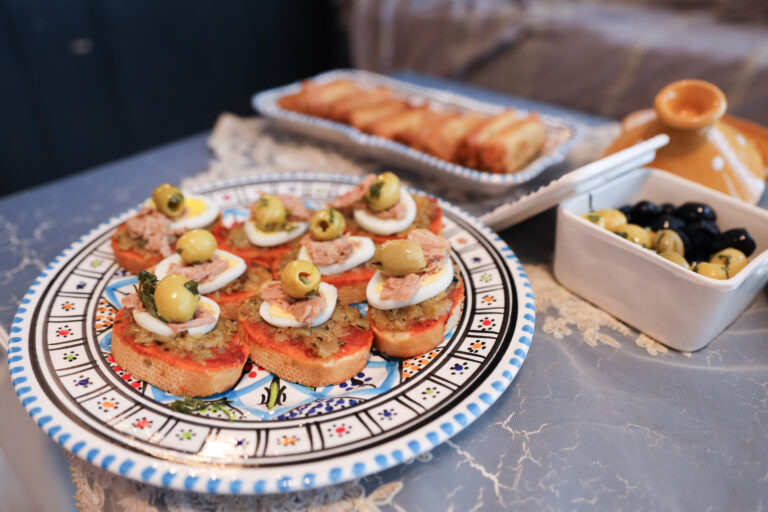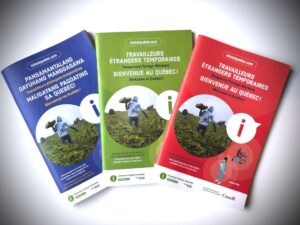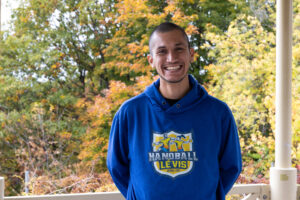After more than two years separated by thousands of kilometers, Tunisians Mariem Ksaier and Chawki Tallous were able to reunite and are now settled in their fourplex in Saint-Ubalde with their baby, permanent residence in hand. Patience and perseverance have paid off!
Text and photos: Marie-Anne Dayé
Behind the door of one of the units in the couple’s newly purchased fourplex, the décor evokes the warmth of Tunisia. The paintings on the walls, the fabrics, the bites of food and the mint tea on the coffee table quickly put us in the mood. Even the crockery is authentic. “I sacrificed a 23kg suitcase to bring the plates!” says Meriem. Tunisian hospitality is no myth: guests who enter this home are immersed in Tunisian culture, a point of pride for this couple in their thirties.
Photo: Mariem has cooked the blankit, an appetizer composed of baguette bread, harissa sauce, roasted pepper salad, eggs, tuna and olives. “Opening a restaurant is a childhood dream, but before that I was always busy with my engineering studies. Here, I’ve touched on that passion, and people enjoy my food,” she says.

The investment in a property and the birth of their first child mark their more official move to Quebec, particularly to Saint-Ubalde, a municipality in Portneuf. After their wedding in 2019, Chawki began the process of working in Quebec. As an engineer in biological and agri-food engineering, he had long wanted to pursue his specialty in Canada. Knowing that it would be arduous to find an avenue related to his field of expertise, he instead signed a contract with Patates Dolbec in 2019, received the positive EIMT and Certificat d’acceptation du Québec (CAQ) the same year, eventually starting work in January 2020. A labourer job was far from his career aspirations, but it was a first step. “The only way to achieve a better future was to take this step. It was one of the least complicated solutions. The most important thing is the goal: to improve our conditions, our family, to live in a country that respects us, where our rights are equal to everyone else’s,” asserts Chawki.
Far from his beloved, he tried several options to get her to join him, either with an open permit or a tourist visa. However, delays and refusals wore down the couple’s patience. The restrictions of the pandemic didn’t help either. “It was really a big ordeal for each of us and for the relationship,” Mariem points out. “We thought it would be a bit easier, but coming here we discovered another reality,” adds Chawki. “The laws are sometimes unfair, especially for newcomers. Canada and Quebec need qualified people. Why do we make their lives difficult, far from their families? The family is part of a person’s development, prosperity and quality of life,” he continues.
Currently, low-wage temporary foreign workers in categories FÉER 4 and 5, as well as seasonal workers in the SAWP and agricultural stream, cannot attach their spouse or partner to their work permit and give them access to an open work permit. Accompanying persons have the option of coming to Quebec with foreign student status, or with their own closed work permit, as was the case for Mariem. As of January 30, 2023, temporary foreign workers in the high-wage stream, regardless of the principal applicant's RRSP category, are eligible for an open permit for their family.
Two and a half years later, in June 2022, Mariem finally arrived in Quebec. Chawki convinced his employer at Patates Dolbec to recruit her as a temporary foreign worker, even though she too is a trained engineer. “They did us a big favor,” he says.
The reunion was expected, but with some trepidation. Chawki had already gone through the period of adaptation to the language (the Quebec accent), customs, workplace interactions and climate. Having lived “alone”, albeit sharing accommodation with his Tunisian and Latin American colleagues, he had to get used to living as a couple again. “When I came here, I found it wasn’t the same person I’d known for years,” says Mariem. “To the point where I said to him, ‘Aren’t you happy I’m here? I can leave!” laughs Mariem.
From temporary to permanent
In 2021, Chawki began the process of obtaining permanent residency for himself and his wife (it is necessary to apply for a Quebec Selection Certificate in one of the targeted programs, to have level 7 in French and to apply for permanent residency with the Canadian government). They obtained it in November 2022. “Canada or Quebec isn’t a transitional period in our lives, it’s the life we’ve chosen,” Mariem assures us. “Saint-Ubalde is now part of us. We’ve developed a sense of belonging,” adds Chawki.
Turning differences into assets
Their integration into Quebec has been gradual, but speaking French has made things easier. Rather than seeing cultural differences as obstacles, Meriem and Chawki used them to create bonds with others. They received all kinds of questions: do you ride camels in Tunisia? Is there internet? They see this lack of knowledge as a way of sharing and getting to know their home country better. In fact, the couple took part in several activities organized by local organization Accès Travail Portneuf, including community kitchens and a day dedicated to Tunisia. Mariem and Chawki presented the country’s culinary and clothing traditions, marriage rituals, Ramadan, and more.
Indispensable support organizations
Chawki insists that without support organizations like Accès Travail Portneuf, his adaptation would not have been as rapid. “Fernand and Yoann accelerated my adaptation because if there wasn’t a third-party intervention to push me to discover things, I would have lived in my shell. Work, go home, talk a bit with my family, not much more,” says Chawki. “I also found a friendship with them. A relationship stronger than a service relationship,” he adds. Thanks to an intercultural twinning program run by the organization, Chawki got to know a lady with whom he could chat and ask questions. With time and Mariem’s arrival, this lady became a member of the family,” says the couple. In fact, she organized the baby’s shower and invited them for the festive season. “The importance of these organizations is that they open a small window on Quebec society,” adds Mariem.
–
The project was funded by the Government of Canada.






